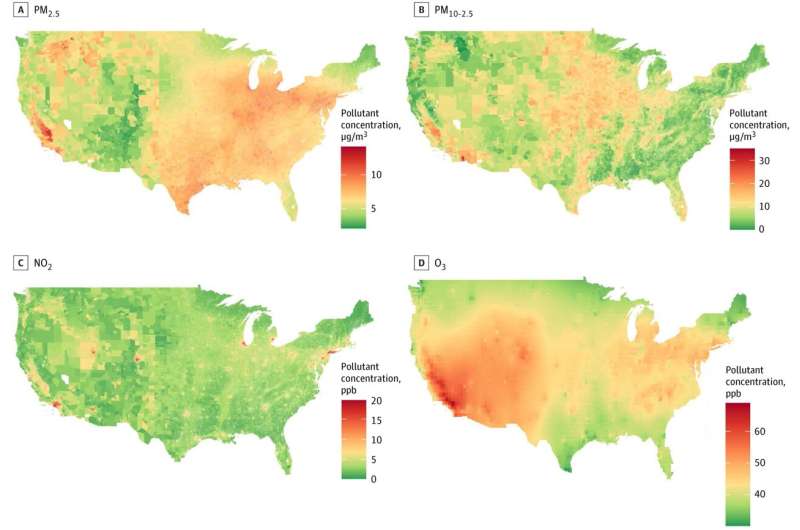This article has been reviewed according to Science X's editorial process and policies. Editors have highlighted the following attributes while ensuring the content's credibility:
fact-checked
peer-reviewed publication
trusted source
proofread
Prolonged exposure to pollution can lead to loss of independence in later life, study suggests

Long-term exposure to air pollution can lead to a loss of independence for older adults, according to a University of Michigan study.
In research published in JAMA Network Open, air pollution from traffic emerges as a key risk factor for older adults losing their ability to care for themselves without some or total assistance. Traffic-related air pollution releases fine particulate matter and gases like nitrogen dioxide into the air that can harm the lungs, heart, brain, and other parts of the body.
Researchers found that when people were exposed to high levels of pollution over long periods, like the 10 years studied in this research, they needed more help to manage their everyday activities.
The study suggests that reducing exposure to air pollution, particularly from traffic sources, could help prolong independent living for older adults, say senior author Sara Adar, associate professor of epidemiology and global public health at the U-M School of Public Health, and Boya Zhang, first author of the study and research fellow at the Harvard T.H. Chan School of Public Health.
"This research indicates that long-term air pollution exposures can lead to persistent health issues that make it harder for a person to take care of themselves at older ages, leading to a need for help for activities that they once managed on their own," Adar said.
"Our research also suggests that where you live can dictate how well you age and indicates that even with our relatively clean air, nearly three-quarters of a million older adults in the United States newly require help with their routine daily activities each year due to their exposures to air pollution. This loss of independence has high emotional and financial costs for families and the health care system."
The findings are based on data from the Health and Retirement Study, a longitudinal study of middle-age and older adults based at the Institute for Social Research at U-M.
Using data from 25,314 study participants, or their survivors, the research by Adar, Zhang and colleagues documented participants' need for help with routine activities of life such as bathing or showering; dressing; getting in and out of bed or a chair; walking; shopping; cleaning; using a phone; using the toilet; managing medications, money or transportation; and moving to a nursing home as they aged.
The survey participants' responses were cross-referenced with where they lived and the long-term air pollution levels estimated by a state-of-the-art exposure model built with information from air pollution monitors, nearby pollution sources and other features of a place.
When comparing participants who remained independent, respondents who lost their independence were more likely to be white and have lower levels of formal education, had a lower mean level of wealth, more likely to have chronic diseases at baseline and had been exposed to higher median levels of most pollutants. In all, nearly 40% of respondents experienced a new loss of independence during the average 10.2 years that they were followed.
"We believe this research extends our understanding of air pollution's health impacts beyond specific chronic diseases to better capture the cumulative burden of air pollution in late life," Zhang said. "These findings are quite important given the global population is aging faster than ever before."
In addition to documenting the act of losing independence, the study estimated the financial cost of lost independence due to air pollution. Applying a yearly cost of $16,028 per person who needed help with activities of daily living, the study estimated that losing independence due to residential exposures to traffic-related air pollution would add up to $11.7 billion in care expenses nationwide per year.
More information: Boya Zhang et al, Source-Specific Air Pollution and Loss of Independence in Older Adults Across the US, JAMA Network Open (2024). DOI: 10.1001/jamanetworkopen.2024.18460




















